Administration Staff and Their Rights: Do You Get Paid or Get Redundancy When a Company Goes Into Administration?
Administration Staff and Their Rights: Do You Get Paid or Get Redundancy When a Company Goes Into Administration?
Blog Article
Business Insolvency Company
7 Preswich Avenue, Leigh, WN7 1RZ
0333 567 1686
Comprehending the Consequences of Firm Liquidation on Worker Retention and Advantages

Effect on Job Protection
In the event of company liquidation, the influence on job security can be significant for employees as uncertainty concerning future employment occurs. When a firm goes right into liquidation, employees face the complicated prospect of prospective task loss. This uncertainty can cause heightened stress and stress and anxiety among the labor force, affecting their spirits and efficiency.
Throughout the liquidation process, staff members may experience a series of feelings, including rage, fear, and irritation, as they face the possibility of joblessness. The absence of quality bordering the timeline of the liquidation and the fate of their positions can produce a feeling of instability within the labor force.
Additionally, staff members might likewise be concerned about the condition of their benefits, such as medical care insurance coverage, retirement, and paid pause, during and after the liquidation process. The possible loss of these advantages adds one more layer of intricacy to an already challenging circumstance for employees.
Changes in Staff Member Perks

One typical adjustment is the reduction or removal of particular benefits to reduce expenses and settle exceptional debts. For circumstances, company contributions to retirement might stop, leaving staff members to bear the full duty of saving for their future. Healthcare benefits might be scaled back, resulting in greater out-of-pocket expenditures for medical services.
Communication becomes critical during this duration of shift. Employers need to be clear concerning the modifications, giving clear explanations and support to assist workers browse through the modifications. Open up discussion and support can aid reduce anxiety and unpredictability amongst the workforce, fostering an extra favorable shift experience regardless of the challenging situations.
Retention Strategies Post-Liquidation
Complying with the business liquidation, executing reliable retention strategies is essential to guarding business ability and keeping stability within the labor force. In times of uncertainty, workers may really feel distressed concerning their future task security and be extra inclined to look for different employment opportunities. To reduce this threat, companies ought to focus on open interaction, providing transparency pertaining to the company's scenario, and using assistance to staff members throughout the change duration.
One key retention technique post-liquidation is to prioritize worker wellness and morale. This can be accomplished via routine check-ins, counseling what happens to staff when a company goes into liquidation services, and creating a positive workplace. Furthermore, providing occupation growth opportunities and upskilling programs can increase worker inspiration and involvement throughout tough times. Identifying and rewarding employees for their commitment and commitment can additionally promote a feeling of commitment and commitment to the company.
Furthermore, establishing a clear profession development path and setting reasonable objectives can offer workers a feeling of instructions and purpose within the business (what happens to staff when a company goes into liquidation). By purchasing staff member growth and proactively involving them in decision-making processes, companies can boost staff member retention prices and develop a resistant labor force post-liquidation
Legal Civil Liberty and Defenses
Throughout the aftermath of company liquidation, it is important to attend to the legal civil liberties and defenses offered to staff members to guarantee a compliant and fair process. It is crucial for staff members to recognize these legal rights and seek legal guidance if required to browse the complexities of the liquidation procedure.
In addition, in cases where a business goes into liquidation, workers are commonly considered advantageous creditors, providing them greater concern in obtaining superior settlements over other financial institutions. This defense assists focus on resolving worker claims prior to other financial commitments are satisfied. Lawful safeguards exist to stop unreasonable dismissals throughout liquidation, ensuring that discontinuations are lugged out according to established labor legislations. Recognizing these legal rights and protections is basic for employees to guard their rate of interests and seek suitable option in the event of business liquidation.
Dealing With Financial Uncertainty
Navigating monetary unpredictability can be a difficult challenge for staff members influenced by firm liquidation. The sudden loss of earnings, advantages, and work safety can considerably interfere with people' economic stability. Throughout such times, it is crucial for workers to examine their existing monetary scenario realistically. Developing a thorough budget plan that focuses on vital expenditures can aid in handling prompt economic requirements. In addition, discovering readily available federal government support programs, such as welfare or retraining possibilities, can provide some relief.
It is important for workers to remain notified concerning their entitlements, such as severance plans or superior settlements, to ensure they get what they are owed. By proactively addressing monetary obstacles, workers can navigate via the uncertainty triggered by company liquidation with better resilience and preparedness.
Final Thought
In conclusion, firm liquidation can have considerable effects on worker job protection, benefits, and overall health. Understanding lawful rights and defenses can aid minimize the impact of liquidation on staff members.
When a business deals with liquidation, the destiny of its workers hangs in the balance, raising critical inquiries regarding job safety and security, advantages, and lasting security. The influence of company liquidation on staff member retention and advantages is a complex issue that requires a more detailed exam to understand the full scope of its repercussions.
Browsing monetary uncertainty can be a difficult obstacle for employees affected by firm liquidation. By proactively dealing with monetary difficulties, workers can navigate through the unpredictability triggered by firm liquidation with greater durability and preparedness.

Report this page